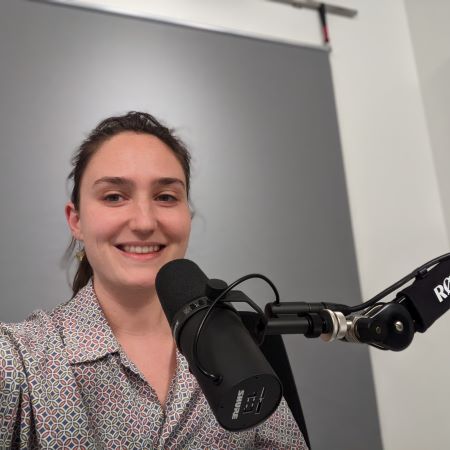Over the next few weeks, we are excited to shine the spotlight on PhD Horizons alumni blogs to coincide with our one-day conference, PhD Horizons: Career insights for PhD students, on Wednesday 19th June 2024. The aim of the conference is to showcase the breadth of non-academic career opportunities open to PhD students and graduates of the University of Edinburgh, as well as early career researchers and post-docs. You can view the PhD Horizons event guide to find out more.
A huge thanks to Zoe Valbret, a University of Edinburgh alumna and recent PhD graduate at the University of Geneva, for kicking off our first blog in the series with an inspiring read. Zoe shares her career journey so far and the valuable skills she has gained from co-founding a podcast.
About Zoe
In August 2019, I graduated from the University of Edinburgh with a Masters in Biomedical Sciences by Research. Being part of two research projects at Edinburgh gave me great insights into working in biomedical labs and inspired me to pursue a PhD.
The jump from Masters to PhD
My Masters studies solidified my passion for cell biology and my preference for working with cells rather than animal models, guiding my search for PhD positions towards cell biology labs. As I’m half-French, I also wanted to have an experience living in a French-speaking place so I was thrilled to find a lab group and project at the University of Geneva, Switzerland, that were a great match for me.
As many PhD students and graduates will tell you; PhDs are challenging! What I found both thrilling and difficult about transitioning to a PhD was that you are stepping into unknown territory and trying to advance scientific knowledge by uncovering what nobody has found before. That’s a really exciting and creative part of science but is also accompanied by a lot of failure and frustration, as biology is complicated, and many experiments fail.
What I have gained from my PhD experience
- Perseverance and resilience: after four years of PhD work and many failed experiments, I learned to get back up a lot faster when I got knocked down by a setback compared with my first year. I think that’s a useful life skill beyond the lab!
- Science communication skills: I was lucky enough to participate in a module where we launched a podcast called “BioSounds”. Interviewing researchers and sharing current science with the general public taught me skills in recording, audio editing, and making complex scientific information more accessible.
Fast forward to today…
My science communication experience has blossomed into “Dr. What Now?”, a podcast for Life Science PhD students and postdocs to get insights into different career paths. I co-founded this podcast with my colleague and friend, Inês Pinheiro. This initiative stemmed from a shared observation: many PhD students, myself included, find the idea of transitioning out of academia quite daunting. After all, we are surrounded by professors and postdocs who have followed traditional academic paths and we often lack exposure to alternative careers.
Aiming to bridge this gap, in each episode of “Dr. What Now?” we interview a Life Sciences PhD graduate who has successfully transitioned to a different career path. We delve into their career transitions, current roles, and valuable career advice for our listeners. By sharing these personal journeys, we aim to empower current PhD students and academics to make informed decisions about their futures. You can listen to “Dr. What Now?” on Spotify.
Some of my favourite career advice from Dr. What Now? podcast guests:
1. “Pay yourself first or think about yourself first.”
Step back and assess the skills you’re acquiring during your PhD and how they can benefit you in the long run.
– Dr. Ezequiel Miron, European Product Manager at Nikon Healthcare Headquarters, episode 1
2.”Think carefully about the skills you have but also what ultimately makes you happy and fulfilled.”
Don’t blindly follow a career path due to pressure. Pursue a path that aligns with your passions.
– Dr. Tiago Faial, Chief Editor at Nature Genetics – episode 11
3. “Dream, dare, do. Especially after your PhD, the world is wide open for you – you can try a job, see if it works for you. If it does, great! If it doesn’t, you have new info and can move on, also great!”
Don’t be afraid to experiment and explore different career options.
– Dr. Theresa Wang, Consultant at Boston Consulting Group – episode 12
What’s next for Zoe?
The podcast has been incredibly rewarding. Receiving messages from listeners who found it helpful is truly motivating. Running the podcast also allowed me to hone my writing, social media management, and multimedia editing skills while meeting inspiring and generous individuals who have contributed to our podcast. As I recently defended my PhD, I am looking for opportunities in science writing; eager to continue communicating scientific knowledge in engaging ways.
Thanks Zoe.
We’re delighted to be sharing more PhD Horizons alumni blogs throughout June – keep your eyes peeled on Inform.ed for more inspiring career journeys.
We hope you enjoy reading the blogs as much as we’ve enjoyed curating them.


